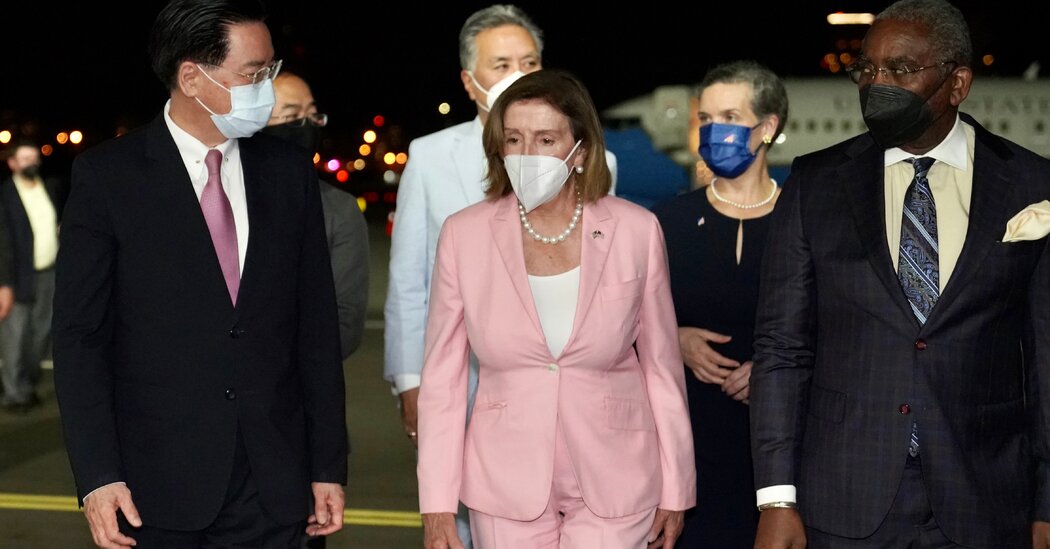As Pelosi touts ‘unwavering’ U.S. commitment to Taiwan, China denounces her visit.

TAIPEI, Taiwan — House Speaker Nancy Pelosi arrived in Taiwan on Tuesday, casting aside private warnings from the Biden administration about the risk that her high-profile diplomatic visit could stoke a new crisis in Asia and immediately drawing a sharp response from the Chinese government.
A U.S. military jet carrying Ms. Pelosi landed in Taipei late Tuesday, after weeks of speculation about her travel plans. Her decision to proceed with the trip — shrouded in official secrecy until the last moment — makes her the highest-ranking congressional official to come to the disputed island in 25 years, and sets up a tense standoff with China that American officials said could lead to more aggressive military posturing.
In a statement released after her arrival, Ms. Pelosi said the visit was a sign of the United States’ “unwavering commitment” to supporting the island’s democracy.
“America’s solidarity with the 23 million people of Taiwan is more important today than ever, as the world faces a choice between autocracy and democracy,” she said. She added that the visit did not contradict U.S. policy on Taiwan.
China, which bristles at any perceived challenge to its claims on Taiwan, had repeatedly warned Ms. Pelosi not to make the visit, and the United States had urged Beijing not to turn the moment into a crisis. After a telephone call last week between President Biden and Xi Jinping, the president of China, the Chinese Foreign Ministry condemned Ms. Pelosi’s expected visit, saying that “playing with fire will set yourself on fire.”
In anticipation of the trip, the government announced that the country’s military would conduct new drills in the strait separating Taiwan and China, one of the busiest shipping lanes in the world. As the plane carrying Ms. Pelosi approached Taiwan, Chinese state media reported that China had sent advanced fighter jets across the strait, a claim that Taiwan’s defense ministry disputed.
After her plane landed, China’s Foreign Ministry further denounced the trip, saying that it “seriously undermines China’s sovereignty and territorial integrity, seriously undermines the political foundation of Sino-U.S. relations and sends a seriously wrong signal to the ‘Taiwan independence’ separatist forces.”
A separate statement issued by the Chinese Communist Party’s Taiwan Affairs Office said any attempt to seek independence by Taiwan would be “shattered by the powerful force of the Chinese people.”
Long a sore issue in a troubled U.S.-China relationship, Taiwan — which has its own military and democratically elected government — has emerged as the front line in a geopolitical showdown over influence and power in Asia.
Under Mr. Xi, China’s most powerful leader in decades, Beijing has taken more aggressive military actions in the region and recently made claims over the strait separating Taiwan and China. Mr. Xi has called for unification with Taiwan as part of China’s national rejuvenation, even potentially by force.
Over the years, the United States has sent a steady stream of senior officials to show solidarity with Taiwan. Recently, Mr. Biden said he would act to defend Taiwan in the event of a conflict, but White House officials have repeatedly walked back those statements, saying a longstanding policy of “strategic ambiguity” on the defense of Taiwan remains in place.
Publicly, senior White House officials have said that Ms. Pelosi’s visit does not indicate any change in official policy, and should be viewed by China as no different than any other visit to Taiwan by members of Congress.
“There is no reason for Beijing to turn a potential visit consistent with longstanding U.S. policy into some sort of crisis or conflict, or use it as a pretext to increase aggressive military activity in or around the Taiwan Strait,” John F. Kirby, a National Security Council spokesman, told reporters.
Claire Fu contributed research.
